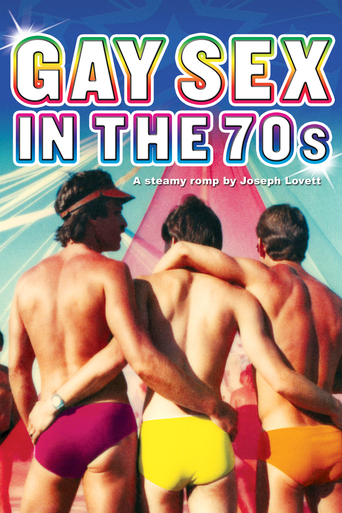Michael Rogers
This movie should be retitled: Sex in the 70s In a Part of New York City called Greenwich Village and Chelsea.This movie does little to talk about sex in the 70s except focus on the hypersexual environments of public and private sex spaces in New York City. I doubt that the Manhole bar was symbolic of actual sex in the 70s and that kind of sex is much more prevalent in the film.Don't get me wrong, the time period looks like a blast. And it's rather important to document the scene to which the film refers. But as far as calling this film Sex in the 70s, the title is a bit misleading. Technically it's no Oscar Nominee, but the rawness of it feels appropriate for the subject.Overall, an "eh."
jayme381
loved it! As a young female living in New York City, Joseph Lovett's film is incredibly eye opening and significant. The documentary will both shock and delight you as it takes the viewer on a journey back to a decade that was both decadent and destructive. This doc can be appreciated by all, as it successfully recaptures a time of exploration and surprise which was briefly situated between the centuries of repression that characterized the pre 1969/Stonewall years and before the AIDS crisis which devastated the gay community. This decade was a watershed momentin the history of the evolution of the gay identity. Beyond the tantalizing subject matter, the technical aspects of the film were impressive to say the least. Specifically, the archival work, which was extensive and entirely relevant All in all, an incredibly significant and fascination doc and an incredibly significant and fascinating era.
Christopher T. Chase
There are very few movies that dispense with the coyness and cleverness of a catchy title, and simply tell you flat out what you can expect to see. This is one of them.Director Joseph Lovett's documentary is kind of like one of those retrospectives you see on VH-1 or the E! Network, only with more naked men, hot explicit sex (well, explicit for a documentary), and snapshots frozen in time that show us visions of a bygone decade, where the Gay Wide World went from draconian repression, to sexual liberation of Bacchanalian proportions, to the next chapter where "the bill came due" for all that excessive indulgence.No one clucks their tongues or passes judgment, as the interviewees regale us with tales of just how things were back in those days, (although you have to consider that there was some extravagant embellishments here and there.) I was only privy to a taste of the lifestyle of which the subjects speak in this film, and I guess I should be grateful for it, because more than likely it saved my life and the lives of more than a few other people I know. Even back then, in my younger days, I only knew of the stories about Fire Island, the New York-based bars, baths and clubs and the infamous Piers and Trucks through hearsay, and it all sounded fabulous, hedonistic and legendary even as it was happening.There are touches of the ominous, though, and it certainly doesn't shy away from the dark side of all that "jazz." There were risks other than STD's, and in pursuit of ultimate bliss, there were some who still paid the ultimate price, and that was way before AIDS came to call.Funny, touching, shocking and sobering all at once, the only drawback is that it isn't the fully rounded account it could be. Maybe Lovett can find a way to extend this into a series and capture more accounts of the shock waves that spread out into other parts of the country, from the "epicenter of the gay universe" as someone in the doc describes the Big Apple. New York and San Francisco were important touchstones of gay culture, but they were not the 'Alpha and Omega' of the Seventies' sexual revolution.At the very least, it is an important historical record that a new generation can learn from, for those who think that "Stonewall" is just another place in the mall where you can buy acid-washed jeans.And on a sadder note, maybe the reason why it hasn't been possible to film a more complete history of "Gay Sex in the Seventies," is because many of the eyewitnesses to this remarkable time in history are no longer here to tell about it. I certainly hope that isn't the case.
michael-1647
This film made me aware for the first time in years of what a heavy wall came down with the AIDS epidemic, sowing fear and shame in a community that had only really begun to form. It was a community that revolved around sex, yes, but was starting to celebrate a self awareness for the accomplishments of it's members in virtually every profession- law, literature, government, education, film, art, food, etc. Watching this film took me back before the days that fear inflicted us as much as the disease. It is a nostalgic look at a rare time, but not a thoughtless one. Maybe this film could not have been made earlier than now, when the narrators can look back from a point of middle aged survival and relative stability and remember what a strange and wonderful time it was.
